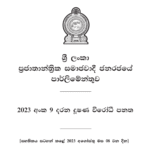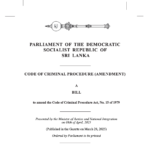Obawath Kankanamage Jinadasa v. Malwa Waduge Bandusoma and Another (SC Appeal 208/2017)
Background of the Case
This appeal involves a property dispute in which Obawath Kankanamage Jinadasa (the plaintiff) sought a declaration of ownership and eviction of the defendants, Malwa Waduge Bandusoma and Manic Pura Hewage Seetha. The primary issue revolved around competing claims to the property based on two documents: a 1992 lease agreement and a series of deeds transferring ownership. The defendants claimed a 99-year lease, while the plaintiff asserted ownership through a sequence of property gifts.
Key Legal Issues
- Validity of the 99-Year Lease Agreement (Deed No. 2396):
- Was the lease agreement legally binding and properly executed, allowing the defendants a valid claim to occupy the property?
- Interpretation of Life Interest and Property Transfers:
- Could Princy Samarawickrama, who held only a life interest in the property at the time of the lease, create a long-term lease extending beyond her life?
- Admissibility and Proving of Notarized Documents:
- Did the lease agreement meet the evidentiary requirements under the Evidence Ordinance to be accepted in court as proof of the defendants’ claim?
Court’s Findings and Reasoning
- Lease Agreement and Life Interest:
- At the time of executing the 1992 lease, Princy Samarawickrama was not the legal owner of the property, as she had previously gifted it to her daughter, Anulawathi, in 1988, retaining only a life interest. Under Sri Lankan law, a life interest does not convey ownership, and thus, any agreement for property use must terminate upon the holder’s death or renouncement of interest.
- The court noted that the 99-year lease was highly improbable, given the limited duration of a life interest. It questioned the plausibility of such an arrangement, especially without clear evidence supporting the lease’s legitimacy.
- Failure to Prove the Lease Agreement’s Validity:
- The Supreme Court scrutinized the lease agreement under Section 68 of the Evidence Ordinance, which requires attestation by at least one witness familiar with the signatory. The notary public who attested the lease admitted he did not personally know Princy Samarawickrama, and no attesting witnesses testified to validate the document.
- Due to these deficiencies, the lease was deemed inadmissible, rendering the defendants’ claim to a long-term lease invalid.
- Deeds of Gift and Property Ownership:
- In 1997, Anulawathi transferred ownership back to Princy Samarawickrama, and in 1998, Princy then gifted the property to another daughter, Manic Pura Hewagw Chureen, relinquishing her life interest.
- In turn, Chureen gifted the property to her husband, Obawath Kankanamage Jinadasa, the plaintiff. The court found that these transactions were valid and duly executed, establishing the plaintiff’s ownership claim.
- Legal Principle Regarding Life Interest and Lease Termination:
- The court reiterated that any lease granted by a life-interest holder cannot exceed the duration of the life interest. Therefore, even if the lease had been valid initially, it would have expired either upon Princy Samarawickrama’s renunciation of her interest in 1998 or upon her death.
Judgment and Outcome
The Supreme Court upheld the District Court’s judgment, confirming the plaintiff’s ownership and dismissing the defendants’ appeal. The court ruled that:
- The lease agreement was improperly executed and did not meet legal standards for admissibility.
- The plaintiff, Obawath Kankanamage Jinadasa, was the rightful owner of the property based on validly executed deeds of gift.
- Any rights the defendants claimed under the unproven lease agreement were void.
The appeal was dismissed with costs.
Implications of the Judgment
- Clarification on Life Interest and Lease Agreements:
- This ruling underscores that a life interest does not grant authority to create binding agreements extending beyond the interest-holder’s lifetime. Lease agreements by life-interest holders terminate with the interest, limiting any claim based on such leases.
- Importance of Proper Notarization and Attestation:
- The case reinforces the necessity for notarized documents to meet the legal requirements for witness attestation, particularly under Section 68 of the Evidence Ordinance. Failure to call a knowledgeable witness or prove the notary’s familiarity with the signatory invalidates such documents.
- Public Policy on Property and Ownership:
- This decision supports the need for clear documentation and valid ownership transfers, ensuring that life-interest holders cannot encumber properties indefinitely. It safeguards property rights and promotes adherence to due process in property transactions.
Conclusion
The Supreme Court’s judgment confirms that life interests carry significant limitations and cannot be used to encumber property beyond the holder’s lifetime. By emphasizing the importance of legally compliant attestation, this decision will guide future property disputes, encouraging clarity in ownership and adherence to procedural requirements in property agreements. The ruling serves as a precedent for validating ownership claims based on properly executed and attested documents, protecting the integrity of property rights in Sri Lanka.
Read Full Judgement














